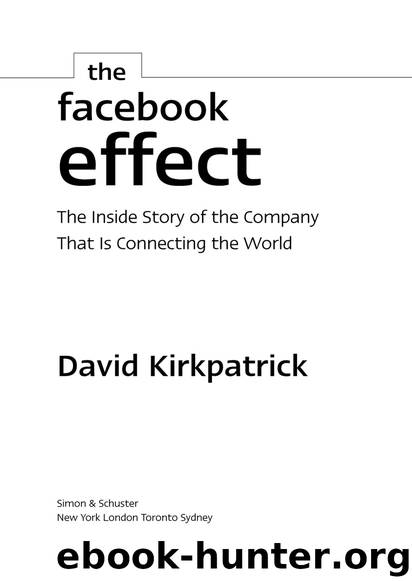The Facebook Effect by David Kirkpatrick

Author:David Kirkpatrick
Language: eng
Format: epub, mobi
Publisher: Simon & Schuster
Published: 2010-03-29T16:00:00+00:00
10
Privacy
“You have one identity.”
How much of ourselves should we show the world? It’s an important question Facebook forces us to confront. Do I want you to know that I am a longtime Fortune magazine journalist who covers technology and is now writing a book about Facebook? Or should I tell you I am a fifty-seven-year-old husband of an artist, father of a teenage girl, sometime poet, and former union activist? Up to now, depending on the social context, I would most likely have presented one or the other of these identities to you. On my single Facebook profile, pretty much all is revealed.
That is no accident. Zuckerberg designed Facebook that way. “You have one identity,” he says emphatically three times in a single minute during a 2009 interview. He recalls that in Facebook’s early days some argued the service ought to offer adult users both a work profile and a “fun social profile.” Zuckerberg was always opposed to that. “The days of you having a different image for your work friends or co-workers and for the other people you know are probably coming to an end pretty quickly,” he says.
He makes several arguments. “Having two identities for yourself is an example of a lack of integrity,” Zuckerberg says moralistically. But he also makes a case he sees as pragmatic—that “the level of transparency the world has now won’t support having two identities for a person.” In other words, even if you want to segregate your personal from your professional information you won’t be able to, as information about you proliferates on the Internet and elsewhere. He would say the same about any images one individual seeks to project—for example, a teenager who acts docile at home but is a drug-using reprobate with his friends.
Zuckerberg, along with a key group of his colleagues, also believes that by openly acknowledging who we are and behaving consistently among all our friends, we will help create a healthier society. In a more “open and transparent” world, people will be held to the consequences of their actions and be more likely to behave responsibly. “To get people to this point where there’s more openness—that’s a big challenge,” says Zuckerberg. “But I think we’ll do it. I just think it will take time. The concept that the world will be better if you share more is something that’s pretty foreign to a lot of people and it runs into all these privacy concerns.”
Most people would find these views discomfiting, and Zuckerberg spends little time dwelling on the obvious downside of his vision. The path to more openness is already strewn with victims whose privacy was unwillingly removed. As one expert in privacy law recently asked, “How many openly gay friends must you have on a social network before you’re outed by implication?” The problems with privacy on Facebook typically arise when the comfortable compartments into which people have segregated various aspects of their lives start to intersect. You may attempt to project one identity for yourself
Download
This site does not store any files on its server. We only index and link to content provided by other sites. Please contact the content providers to delete copyright contents if any and email us, we'll remove relevant links or contents immediately.
| Biographies | Company Profiles |
| Economic History |
Pale Blue Dot by Carl Sagan(5008)
The Rules Do Not Apply by Ariel Levy(4969)
Goodbye Paradise(3810)
Ogilvy on Advertising by David Ogilvy(3622)
Liar's Poker by Michael Lewis(3448)
Delivering Happiness by Tony Hsieh(3425)
Into Thin Air by Jon Krakauer(3399)
Purple Cow by Seth Godin(3203)
Rogue Trader by Leeson Nick(3044)
The Social Psychology of Inequality by Unknown(3031)
The Airbnb Story by Leigh Gallagher(2854)
4 - Harry Potter and the Goblet of Fire by J.K. Rowling(2703)
The Mind Map Book by Tony Buzan(2578)
Bossypants by Tina Fey(2532)
Claridge's: The Cookbook by Nail Martyn & Erickson Meredith(2404)
All the President's Men by Carl Bernstein & Bob Woodward(2378)
Six Billion Shoppers by Porter Erisman(2302)
Master of the Game by Sidney Sheldon(2290)
Alibaba by Duncan Clark(2083)
